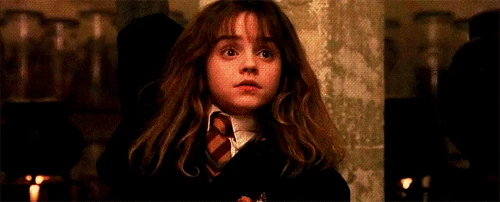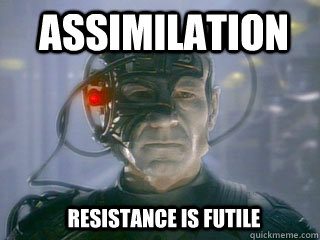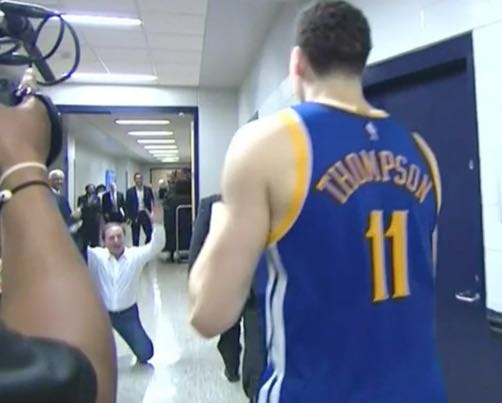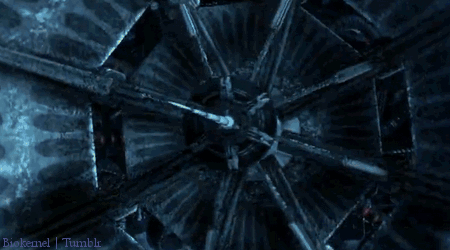3,982 Matching Annotations
- Jun 2016
-
well.blogs.nytimes.com well.blogs.nytimes.com
-
higher princess involvement
Shouldn't this be capitalized?
-
-
er.educause.edu er.educause.edu
-
The Internet is made of people, not things.
Great line!
-
What will we do with the information when we also know the heart rate of students as they're accessing (or not accessing) a course?
Help us intervene when stress levels are too high? Ok, maybe that's going too far. But this same tech could be used just as much to alleviate the shock as administer it, no?
-
I am worried that students' own laptop cameras might be used to monitor them while they take tests.
Me too, and this abuse should be protected against, but this seems a leap from the potential described above. What about those "analytics" accessed to to enable a teacher to plan class around passages that stumped students, based on data gathered about their reading habits? While I'm worried too, I think jumping too quickly to the "management" argument oversteps the more important and difficult work of figuring out how to make these technologies work for human learners--something that I know Jesse does on a regular basis and has for sometime.
-
But my own personal curiosity and fascination are outweighed by my concern at the degree to which similar devices are being used in education to monitor and police learning.
Is this a strict binary? Or is the same pleasure, heightened-consciousness, and productivity also a potential of education in addition to personal technology? Though obviously the one is an individual choice entered into voluntarily while the other a system a student is entered into by a teacher, and that distinction is critical and requires the need for laying visible the politics of tools, I still think there's plenty of overlap.
-
-
reb.us reb.us
-
-
www.nytimes.com www.nytimes.com
-
The center must hold.
Reference to a famous poem by the Irish poet William Butler Yeats about post-WWII Europe, "The Second Coming":
Turning and turning in the widening gyre / The falcon cannot hear the falconer; / Things fall apart; the centre cannot hold...
-
The right attacks immigrants while the left rails at bankers, but the spirit of insurgency, the venting of anger at those in power and the addiction to simple, demagogic answers to complex problems are the same for both extremes. Underlying it all is a shared hostility to globalization.
Sounds pretty familiar in this US election year.
-
-
www.hewlett.org www.hewlett.org
-
Look for existing networks for collaboration that could be adapted to fit the strategy if formal networks are desired.
Work with OpenStax here on grant application? Could we somehow piggy back on their relationship with Hewlett and build for them their annotation solution--most recently articulated as requiring better teacher-student communication?
-
ANCHOR INSTITUTIONS
Name names...
-
OER must have the right metadata
Could h provide that metadata?!
-
SUPPORTING ROBUST TECHNICAL and INSTITUTIONAL INFRASTRUCTURE
Possibly where h fits in...
-
TOP 3 PUBLISHERS CONTROL 90% OF THE MARKET
Yikes!
-
HANGERS-ON
Do pencils really come with these clips?
-
the Foundation will provide enhanced support for grantee collaboration.
We're already working with grantees: OpenStax, Lumen, Rebus.
Perhaps the OpenStax collaboration could get funding to enhance 1:1 communication within textbooks.
-
the technical basis for OER
-
robust and flexible infrastructure.
In so far as collaborative annotation might be critical to a broader OER infrastructure, then perhaps it does contribute to scale.
-
Moreover, ZTC degrees ensure that the benefits of open materials follow students from enrollment to graduation, allowing for a pathway of personalized courses that guide students toward completing their degrees.
What infrastructure would hold this together, especially if textbooks are remixed and mashed up by both students and teachers. Perhaps an annotation system?
-
Open materials can empower faculty with the aca-demic freedom to tailor their courses to their students’ needs and even engage students in meaningful learning experiences through adaptation and improvement of the open content itself.10
HUGE, especially the part about "meaningful learning experiences."
This is something Kathi Fletcher (OpenStax) alluded to in the edu board meeting: using h to provide a line of communication between students and teachers.
-
reserve part of its portfolio to con-tinue funding the infrastructure necessary to support the field
This is at least part of h's play IMO. Annotation should be part of this infrastructure, not only for post-publication discussion but for production and discovery of such resources as well.
-
Therefore, we refreshed our OER strategy to focus on our goal of using grants to help OER reach mainstream adoption.
This stage of funding is focused on scale.
-
high-quality academic materials
Are tools "materials"?
-
-
robinderosa.net robinderosa.net
-
Suddenly, our student-created textbook was turning into a cacophonous, heteroglossic tapestry of voices talking to each other about the literature.
Love.
-
which allows readers to take notes on the text digitally.
The above linked New Yorker article actually offers annotation as a solution to the problems of reading on screens, slowing the inherent skimming of online text down a bit.
Here's the article annotated by Robin's class (and a few more, I think).
-
Don’t worry about producing a beautiful, flawless textbook.
Ever or at first. I'd say ever. Let it be about process, but teach students about professional presentation as well.
-
often revised them after we discussed the text in class if they thought they could improve them.
Were they at all inspired by annotations in these revisions?
-
If you are somewhat tech-savvy and comfortable playing around with things, you could definitely teach yourself the basics in an hour or so.
Here's a little how-to for those interested.
-
I hired a bunch of undergrad students and recent alums, and paid them out of my own pocket to assist me.
I did not know this. And I already thought Robin was a bad-ass. There should be national, philanthropic funding for projects like this.
-
-
www.hewlett.org www.hewlett.org
-
and any other tools, materials, or techniques used to support access to knowledge.
Tools are OERs.
-
and refreshed OER strategy.
This "refresh" was done December 2015.
-
The infrastructure
Hmm, I wonder if this is thinking inspired by the NGDLE movement (from Gates, EDUCAUSE)?
-
Develop innovative OER models
I suppose that would be us.
-
-
www.insidehighered.com www.insidehighered.com
-
the frustration faculty members sometimes feel when searching for open content to include in their courses.
Annotation could help with this discovery, evaluation, and remixing process.
-
thinking more broadly about what ‘open’ means and how open connects to a variety of different areas
Yes!
-
-
www.aclu.org www.aclu.org
-
www.theatlantic.com www.theatlantic.com
-
www.stltoday.com www.stltoday.com
-
media.wix.com media.wix.com
-
good mentor
test
-
Research has clearly shown
test
-
-
umwdtlt.com umwdtlt.com
-
This one tool, which played a part in just one course for five students,
Clickers for 5 students?
-
-
mfeldstein.com mfeldstein.com
-
There is an interesting angle here in that Sakai is open source yet data is not easily recoverable.
Hmmmm...
-
-
www.nytimes.com www.nytimes.com
-
He was playing a role, the party guy, the proprietor of the china shop in the time of the bull.
New one for me:

-
Obama’s net job-approval rating has risen nearly 20 points since Trump became the G.O.P. front-runner and the party’s inescapable face last summer.
Oh, wow!
-
Four years later, the leader of what many Republicans had hoped was a nativist fringe movement is the party’s presumed nominee.
Sigh.
-
(Jindal dropped out in November; Trump barely bothered to insult him.)

-
and other lower-body drivers.

-
store
I thought he said "sore." That would have been a real zinger.
-
Priebus was saying in effect that it would be possible to build a wall around Donald Trump and not have the G.O.P. pay for it.

-
listening to Newt Gingrich speeches on cassettes in his car — party-guy things.

-
-
www.nytimes.com www.nytimes.com
-
A lively sequence can stoke flirtatious undertones or show off sparkling wit. One perfectly chosen emoji could suspend a mood in time, like an ’80s movie that ends on an exultant freeze frame.
I love this simile on so many different levels.

-
-
www.nytimes.com www.nytimes.com
-
With a few exceptions — “The Wire,” notably — TV drama resists the idea that characters’ outcomes are fated, as in Greek tragedy, by larger powers. It wants its protagonists to steer the ship, not to be carried by the current.
Such a powerful myth in US society!
-
-
www.nytimes.com www.nytimes.com
-
lingering for an extra look at the mauling of the man who brutalized her.
This was better than the smile in walking away. I could be wrong but I remember her starting to turn and then stopping to watch his death just a little longer.
-
And about that: Do we really think Jon would have gone forward with “what we have” had he known Arryn reinforcements might be arriving soon? How many more men died, on both sides, because Sansa didn’t tell Jon about her letter to Littlefinger and what it could bring?
For real.
-
-
www.amicalnet.org www.amicalnet.org
-
Should faculty (and even students) have a greater say in which tools the university chooses instead of constantly finding themselves as consumers of those forced upon them by the institution?
The answer here is clearly yes. But what forums exist or might be imagined to enable this dialogue. I know at h we are lucky (if I might say so myself) to have an educator on staff and we work closely with faculty on our product. What more could we do though? And how could an indie ed tech community more broadly nurture these conversations?...
-
One of the things that is oft-repeated in our line of work is “it’s not about the technology,” or “it’s not about the tool!”
This reminds me of how people use to defend "Birth of a Nation" for it's technical filmic accomplishments without interrogating how those innovations were also bound up with the film's racism.
-
-
nextgenlearning.org nextgenlearning.org
-
Today, the path to regaining control lies less in writing super-large chunks of code and more in forming consortia that serve a variety of purposes.
Can h follow this model as well?
-
About a decade ago, there was surge of impatience with the LMS, similar to what we are seeing today. So the community banded together and jointly wrote code to create an open source LMS, called Sakai.
The open source Sakai born of frustration with proprietary systems?
-
-
-
www.edsurge.com www.edsurge.com
-
educause.acms.com educause.acms.com
-
-
-
like a necklace.
What a really fucking strange analogy to use here?!
-
-
www.eduappcenter.com www.eduappcenter.com
-
Configurations Canvas Moodle Blackboard Sakai Desire2Learn
These may e the key links to making an LTI app work in other LMSs besides Canvas.
Tags
Annotators
URL
-
-
www.eduappcenter.com www.eduappcenter.com
-
this is the type of context from which the user is accessing the app. If it's provided, this will most likely be CourseSection
So a Canvas user is mapped to a course and, possibly, a course section. The former could be used to auto-provision a group. The latter, though, could be used (optionally) to create multiple private groups in a course. If I'm right, then that's neat.
-
Learner Instructor
I suppose we'd need to map these roles to user roles in H. Or at least map a teacher role to an imminent group admin role.
-
unique id referencing the user accessing the app. providers should consider this id an opaque identifier.
Is the fact that this and the below are not labeled "required" mean that SSO/authentication/whatever is not a requisite part of being an app in the store?
Tags
Annotators
URL
-
-
-
But the biggest gains in insight come when we deconstruct documents into their component pieces and allow their reassembly into new understandings.
I don't disagree that this is important and maybe I'm still blissfully and ignorantly stuck in the Matrix of the web as conversation, but for me, the biggest gains in insight come from reading a text with someone else. I am an English teacher after all.
-
Why would you manage and update past speech acts to be less context-driven (Garden) when you could just make new speech acts for a new context (Stream)?
I'm struggling over the relation of garden/stream to context: for me, it is the garden that is context-driven. Streams lack context.
-
For some things this makes sense, but for others an endless proliferation variations and different takes is a net positive. Wikity tries to harness this power of proliferation over consolidation.
Borgessian.
-
-
www.eduappcenter.com www.eduappcenter.com
-
including passing scores from the provider back to the gradebook of the consumer,
Can this just be for completion? Like a number of annotations created per assignment?
-
-
www.eduappcenter.com www.eduappcenter.com
-
specific course
Auto-provisioning h account and assigning user to a group, mapped to course.
-
-
library.educause.edu library.educause.edu
-
What is clear is that the LMS has been highly successful in enabling the administrationof learning but less so in enabling learning itself.
This is the key it would seem and perhaps signals a turning point in IT/ed-tech? One which I hope will foster more teacher-technologist collaboration.
-
A mash-up is a web page or application that “uses content from more than one source to create a single new service displayed in a single graphical interface.”8Hence it uses a heterogeneity of components to produce a homogeneity of function.
Fascinating. The reminds me of my hopes and dreams for the hypothes.is activity pages...
-
Clusters of institutions could form consortia (such as Unizin or C-BEN)10to set up co-ops to provide a buffet of apps and other tools, either purchased or donated. In this case, each institution’s learning environment would be a unique blend of these components
Reminding me of the idea Dan had about a consortium of open education tools...
-
The Experience API is an example of an API that “makes itpossible to collect data about the wide range of experiences a person has (online and offline).”
xAPI. What Billy Meinke was talking about.
-
-
-
library.educause.edu library.educause.edu
-
Tomorrow’s system environments will better integrate collaboration and engagement features into the user experience, allowing faculty to easily make these features an integral part of their courses and providing students with flexible, varied, and ongoing means of engagement.
This might be the key contribution h could make in this space.
-
-
Feedback about your performance compared to that of other students*
Perhaps h can cover this by offering 1:1 messaging between students and teachers:
1) ability for teacher to "post" annotation directly to a student user
2) ability of student to "post" a question (as annotation) to a particular piece of text
-
-
library.educause.edu library.educause.edu
-
Define potential investments to accelerate the development of the next generation digital learning environment.
From Gates?
-
Bill and Melinda Gates Foundation
-
-
-
library.educause.edu library.educause.edu
-
a component-based approach that introduces flexibility and variability to address learning needs more specifically
H is more component than system in and of itself.
-
creating the NGDLE will require co-ordinated efforts among vendors, colleges and universities, and standards bodies,
How does h get involved?
-
mind-set
A mind set--focused on standards, interoperability, and federation--that hypothes.is certainly shares.
-
and Instructure
Curious about Instructure's involvement here. I realize NGDLE is not exactly anti-LMS, but it kind of is...
-
the LMS is valuable for handling the administrative duties of a course, it is less successful in effectively facilitating learning, especially as higher education actively develops new course models and pedagogical approaches.
If what is missing from the LMS are actual learning tools, then certainly h adds an aspect of this.
-
Because they conform to the standards set by the learning environment,
LTI?
-
-
-
er.educause.edu er.educause.edu
-
a useful label for strategic thinking about the future of learning environments in higher education.
Indeed!
-
NGDLE "sightings "—nascent initiatives and developments that are moving in the direction of the NGDLE

-
the growing appreciation of and support for openness based on interoperability standards;
Word.
-
-
-
web.hypothes.is web.hypothes.is
-
It’s a pretty cool technology that has come a long way in the last few years.
-
-
www.imsglobal.org www.imsglobal.org
Tags
Annotators
URL
-
-
er.educause.edu er.educause.edu
-
www.imsglobal.org www.imsglobal.org
-
-
er.educause.edu er.educause.edu
-
to find employees with the skills needed to navigate the future.
There is a bit of neoliberalism to this essay, I suppose--in the vein of the LARB critique of digital humanities more broadly.
-
The specialist is dead. Long live the entrepreneur. As a result, the entire definition of what it takes to be literate has changed.
Fascinating. I'd like to count myself in this broadly defined sense of entrepreneur.
-
Find and vet information online. In the digital world, being able to not only find information online but also determine its quality and validity is crucial.
Vetting could be done through annotation/bookmarking.
-
Some people have argued that widespread literacy (understood as reading at an eighth-grade level) was about making sure factory workers could read manuals well enough to keep machines running, rather than about providing for an informed citizenry. The equivalent for digital literacy would be to define it simply as being able to learn software quickly. Instead, digital literacy should be defined as knowing the effective practices suited to the dominant media. We should not teach students just the skills that will prepare them to follow instructions or quickly comprehend a user interface; instead we should aim to help students develop the expertise that will allow them to combine and create technologies to develop new and dynamic solutions. Just as traditional literacy and the liberal arts have been the key to independence since the advent of public schooling, digital literacy today is about intellectual freedom (see figure 1).
Very interesting.
-
Despite having grown up with access to an increasing amount of technology, students now need to learn how to use technology to solve problems in academic and professional settings.
So "digital native" is not enough. Digital literacy is something different, something more.
-
The people who were comfortable at this humanities-technology intersection helped to create the human-machine symbiosis that is at the core of this story. Walter Isaacson, "The Innovators: How a Group of Inventors, Hackers, Geniuses and Geeks Created the Digital Revolution" (2014)
Great line!
-
Design and create digital solutions. Ultimately students should build a skill set that allows them to develop or customize their own digital tools. This does not necessarily mean that students need to be able to write their own applications from scratch. Rather, they should be comfortable customizing and combining tools to create a complete solution—for example, creating a web-form to automate the collection of customer evaluations and then outputting the results to a spreadsheet for analysis.
Is this an argument against online learning as a "management" problem?
-
Resistance, however, is as futile

-
-
www.nytimes.com www.nytimes.com
-
“The infrastructure in this city of millions is the people themselves providing, being there for others.
I love this idea of people as infrastructure!
-
-
www.washingtonpost.com www.washingtonpost.com
-
dp.la dp.la
-
render accessible
Seems ultimately problematic. I'm thinking of Edward Abbey's lament on the hyper-accessibility of National Parks by the second half of the 20th century.
-
-
chronicle.com chronicle.com
-
Comment (1)
Why are comments closed on this article? Is that a CHE policy after a certain amount of time? Not that this blog post necessarily warrants it, but this is nonetheless a demonstration of the importance of the original "without consent" language of the Hypothes.is principles: should we need CHE approval of our comments? Should we be reliant on the for-profit, closed source Disqus to store our comments?
-
In the broader culture, it’s hard not to stumble a little over the phrase, “without consent.”
Yes, this was something brought to our attention in the wake of the controversy surrounding News Genius. We wrote about it here just before this ProfHacker post was published.
While we agree with Jason here that the "without consent" is part of the very idea of open web annotation, we did decide that the word choice of that statement was fraught and have changed it in our principles.
-
-
www.newyorker.com www.newyorker.com
-
her role as a prominent working woman, and hence a symbol of feminism at a time when feminism is under siege.
-
“telescopic philanthropy,”
That sounds quite different than the Hillary Clinton who has, allegedly, repeatedly prioritized personal gain above all else. The villainous Hillary of the Clinton Foundation's Clinton Global Initiative.
-
Like horse-racing, Hillary-hating has become one of those national pastimes which unite the élite and the lumpen
-
-
-
www.donaldjtrump.com www.donaldjtrump.com
-
In his remarks today, President Obama disgracefully refused to even say the words 'Radical Islam'.
I still can't get over the immediate pivot to attacking Obama and Clinton. I realize that Trump is all about not being "politically correct," but to pass over the immediate tragedy and those affected by it in such a perfunctory way just seems to evidence is egomania.
-
According to Pew, 99% of people in Afghanistan support oppressive Sharia Law.
Ethos!
-
-
-
www.nytimes.com www.nytimes.com
-
www.newyorker.com www.newyorker.com
-
“If we do not get tough and smart real fast, we are not going to have a country anymore,” Trump said in a statement posted on his campaign’s Web site. “Because our leaders are weak, I said this was going to happen—and it is only going to get worse. I am trying to save lives and prevent the next terrorist attack. We can’t afford to be politically correct anymore.”
Here's an annotatable link.
-
rancid wit
Like this phrase for Trump.
-
-
www.learntechlib.org www.learntechlib.org
-
most systems try to adapt the paper-and-pen paradigm to the digital world. That’s why many systems suffer from several shortcomings inherent in the paper-and-pen paradigm.
Tags
Annotators
URL
-
-
dl.acm.org dl.acm.org
-
The growth in web-based learning materials and information sources has created requirement for systems that allow annotations to be attached to these new sources and, potentially, shared with other learners.
Tags
Annotators
URL
-
-
www.theverge.com www.theverge.com
-
delightful,
Word choice?
-
-
johnastewart.org johnastewart.org
-
kris.shaffermusic.com kris.shaffermusic.com
-
jeremydean.org jeremydean.org
-
The Web
This annotation created inside "the Canvas version" of this PDF.
-
because it was built on egali-tarian principles
As hypothes.is aspires to do with annotation...
-
The world wide web went live, on my physical desktop in geneva, switzer-land, in December 1990.

-
-
h.jonudell.info h.jonudell.info
-
Death!Plop.
LOL
-
-
hybridpedagogy.org hybridpedagogy.org
-
I asked about “conversation”, “dialogue”, and “community”. Her responses showed that these are, for Coursera, an afterthought. And after playing around inside the guts of the tool, it remains clear to me that these are, indeed, an afterthought. All the proof I need is that it’s about ten times easier to upload a video, and track the watching of that video, than it is to administer the discussion forum.
I truly believe that social annotation could be the mechanism that brings authentic, engaging conversation to MOOCs. For one, annotation takes place on top of content (in all its slick delivery) rather than in a siloed discussion forum.
-
-
slack-files.com slack-files.com
-
barges down in
tried
-
-
www.nytimes.com www.nytimes.com
-
This was 1982
Though it shouldn't have--the whole article is about how segregation persists into the present day--this date nonetheless surprised me.
-
-
-
I’m too much of a fighter.
Is that what they say? Seems a generous recouching of the critiques of, say, racism.
-
-
-
-
and they set it forth in something called the Declaration of Sentiments,
While we're at it, let's annotate the original "Declaration of Sentiments."
-
-
-
docs.google.com docs.google.com
-
join this call.
You have to join the hypothes.is Education Advisory Board group in order to be able to see/contribute annotations to that layer.

-
-
undark.org undark.org
-
And here’s a pleasant surprise: This is not a pro-bono project.
This is great. Too often this work is expected for free. And while it has to be in some ways, when the money can be found, it's best practice for content producers to get paid. It's one of the ways IMO that journalists and academics will begin to view annotation as part of their professional labor.
-
-
www.nytimes.com www.nytimes.com
-
Speaker Paul D. Ryan on Tuesday called Donald J. Trump’s criticism of a federal judge of Hispanic heritage “the textbook definition of a racist comment” and said he “regrets” the remark. But Mr. Ryan also reiterated his support for Mr. Trump, the presumptive Republican presidential nominee.
-
He said, “I believe that we have more common ground on the policy issues of the day and we have more likelihood of getting our policies enacted with him than with her.”

-
Speaker Paul D. Ryan on Tuesday called Donald J. Trump’s criticism of a Hispanic-American judge “the textbook definition of a racist comment” and said he “regrets” the remark. But Mr. Ryan also reiterated his support for Mr. Trump, the presumptive Republican presidential nominee, against Hillary Clinton.
This is precisely what's wrong with the GOP. Nothing new, but never more stark.
-
-
www.nytimes.com www.nytimes.com
-
The Internet is going the way of the Weblog, the Electronic Message and the World Wide Web.
But not "Dumpster"?!
-
-
-
The Wailing Wailers is one that has been available since its original 1966 release, specifically by New England’s Heartbeat Records. Heartbeat lovingly reissued a good number of Studio One releases from 1983 through to the mid-'00s, but changes in the music industry meant that Heartbeat petered out.
Pretty bummed I sold off all my old Heartbeat CDs.
-
-
www.nytimes.com www.nytimes.com
-
It’s like a Tarantino remake of “The Harder They Come” but with a soundtrack by Bob Marley and a script by Oliver Stone and William Faulkner, with maybe a little creative boost from some primo ganja.
How could I possibly have missed this novel? (Opens Amazon immediately)
-
-
www.aacu.org www.aacu.org
-
Do not read your paper at the Annual Meeting. This is the top complaint from audience members each year. Proposals that refer to the presentation as “this paper” will not be considered. Speakers that read papers will not be accepted for future presentations.
Wow! More conferences should adopt this policy.
Tags
Annotators
URL
-
-
-
an “I made more money than you” certificate.
I think that's just more money.
-
-
hapgood.us hapgood.us
-
And this is crucial to our talk here, because these abilities – to link, annotate, change, summarize, copy, and share — these are the verbs of gardening.
-
-
docs.google.com docs.google.com
-
Less than 30 of less then 300 classes responded. So around 10%.
This also means we had roughly 5000 students using h this year.
-
-
www.nytimes.com www.nytimes.com
-
The internal guidebooks for employees of Trump University provide a detailed set of instructions for how to sell the classes, even to skeptical and reluctant consumers, by tapping into their psychological needs.

-
-
-
Joe Lacob, the Warriors’ owner, who, upon spotting Thompson after Game 6, went down on one knee and bowed.

-
- May 2016
-
www.newyorker.com www.newyorker.com
-
That frogs and toads shouldn’t be trusted with basic garden work? Lobel’s ending,
C.
-
-
www.nytimes.com www.nytimes.com
-
citing Mrs. Clinton’s establishment ties
Experience?
-
turn away from his candidacy en masse.
Do they need to turn to Hillary, though?
-
an almost uniformly white primary electorate.
Come on, give the guy some credit:

-
-
www.linkedin.com www.linkedin.com
-
In other words, if you offer your software on an open and free basis, any use is fair use.
Ouch!
-
-
www.tceaconvention.org www.tceaconvention.org
-
Make sure your audience will leave with tangible tools than be exhausted from word vomit.
TCEA keeping it visceral!
-
-
scholarlykitchen.sspnet.org scholarlykitchen.sspnet.org
-
SSRN had one of the early freemium business models for an open access service.
-
-
marketbrief.edweek.org marketbrief.edweek.org
-
that OER can provide benefits to some schools, but that commercial resources will continue to have value because of the tech-based enhancements, in analytics and adaptive learning and other areas, that they offer beyond academic content.
Why can't OERs have the equivalent?
-
-
www.edweek.org www.edweek.org
-
Apple and Maine education officials are allowing school districts to trade in iPads for laptops after teachers and students say the computers are better for schoolwork.
No shit.
-
-
www.edsurge.com www.edsurge.com
-
He also suggested the Open eBooks app, developed by a partnership between New York Public Library, Digital Public Library of America and First Book, as a free alternative for teachers seeking digital reading materials.
What a cool project!
-
right now there’s not a market for the product we’re built.”
Hmmm...
-
Even in those rare cases where schools have enough bandwidth to support devices for every student, Singer adds that “you still need someone at the admin level who can help implement the tools across the network, and [those people are] hard to find. And then you need teachers who have the time, permission and training to use the tool in the classroom.” All these hurdles add up to “a space that is just not quite ready to utilize the technology,” he says.
A K-12 problem?
-
schools
as customers
-
“curriculets,” the company’s eponymous term for embedded quizzes, videos and other multimedia elements designed to offer students a richer reading experience and to give teachers data into how their pupils were progressing.
As a teacher, I don't know that I want this prefabricated, though....
-
articles and take quizzes,
And annotate, I believe.
-
-
www.edsurge.com www.edsurge.com
-
Freemium companies walk a tightrope with their customers: The free features have to be attractive enough to draw users—but not so powerful that users don’t want to pay for the upgrade.
-
-
www.insidehighered.com www.insidehighered.com
-
It’s sort of like when Netflix suggests a movie you might like, based on what you’ve seen and rated to that point. As with Netflix, you’re free to override the suggestion, but people often find them helpful.
I've "discovered" lots of good content via Netflix's algorithm.
-
idea is to make the path obvious and clear,
Is it necessarily singular?
-
the idea is that much student attrition is due to them simply getting lost and wasting time and resources going down blind alleys.
Makes sense.
-
-
www.theverge.com www.theverge.com
-
This is in part why there is no opt-out mechanism for site owners. If you squint, this tactic looks vaguely reminiscent of Uber’s consistently ruthless expansion into new cities, often with little regard for the relevant local ordinances.
Hmmm...
-
We can also take a cue from Genius engineering: the filename of the main annotation script is actually injection.js, and one of the things it injects is explicitly labeled as a "clickjacker." The use of special terminology, which typically refers to exploits, suggests that the decision to model the product after security flaws was deliberate.
Nice close reading of the code!
-
Based on the server connections, the proxied page is technically now a site served by Genius, and as such, they are now well within their rights to define the security restrictions.
Really?
-
if they’d just been loaded on the original page.
So is this technically correct, it is by definition a "different page"? If so, then it would seem copyright law would similarly be against proxying.
-
Or it might add a "clickjacker," an invisible layer that sits over the entire page, capturing your clicks and making them do unexpected things — like transfer funds.
Wow!
-
-
www.nytimes.com www.nytimes.com
-
You can easily click on “like,” for example, but there is not yet a “this was a challenging but important story” button.
Great idea! Here's a rough mock-up thanks to "Da Button Factory":

-
Once these algorithms with an enormous number of moving parts are set loose, they then interact with the world, and learn and react. The consequences aren’t easily predictable.

-
-
-
Little of the material taught in Liberal Arts programs today is relevant to the future.
Yikes!
-
-
www.nytimes.com www.nytimes.com
-
(Where some of these kill-the-humanities pieces are concerned, the strongest case for the liberal arts is made just in trying to read them.)
LOL.
-
The firm’s idea was that by hiring a certain lunatic fringe of humanities majors, it might cut down on engineering groupthink.
Makes sense to me, among other reasons.
-
